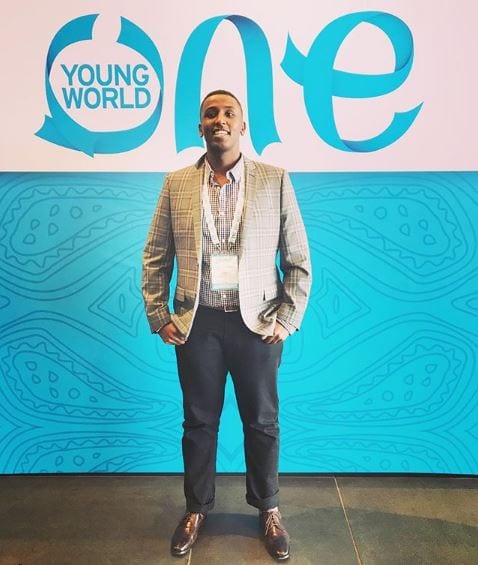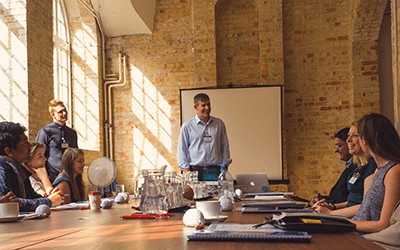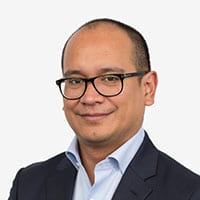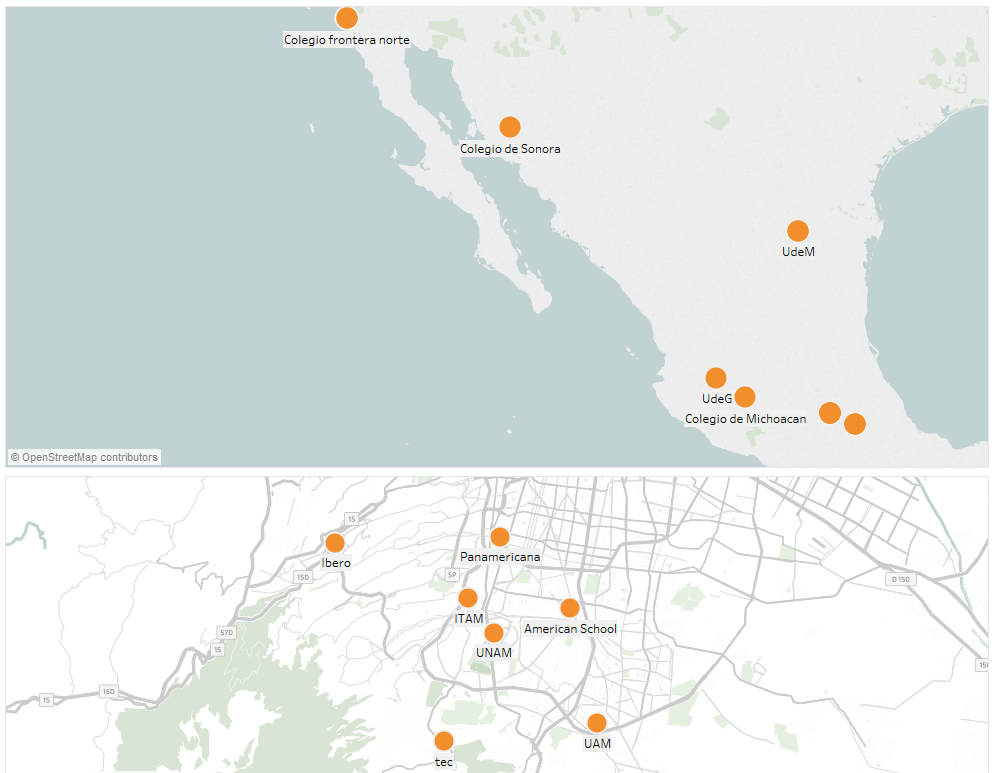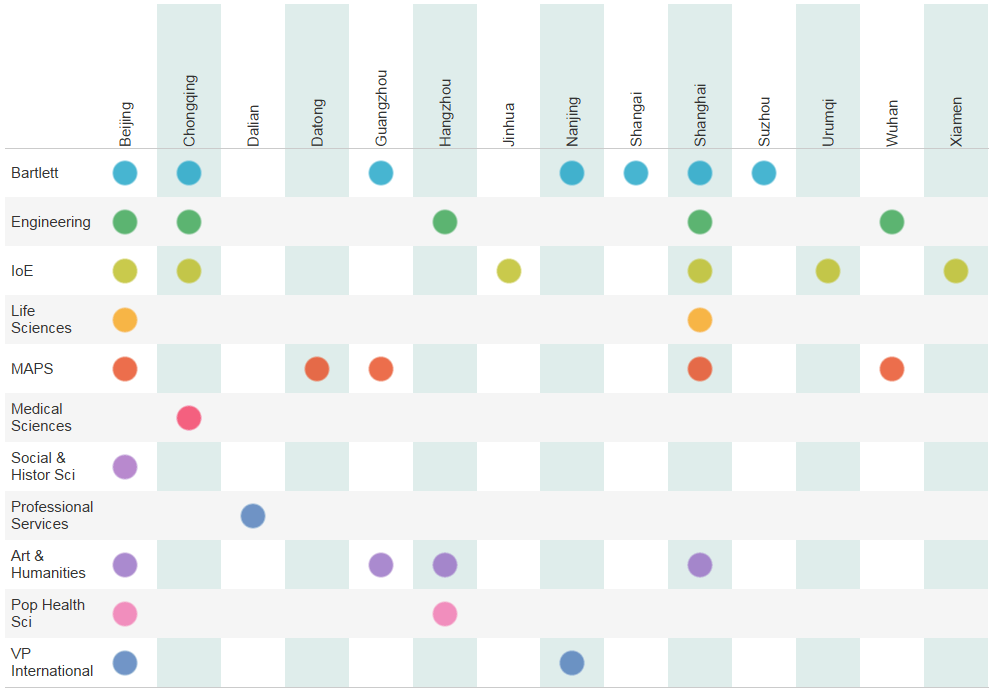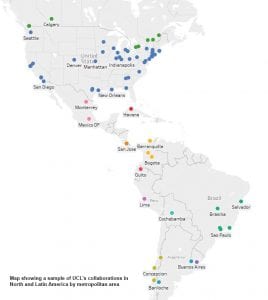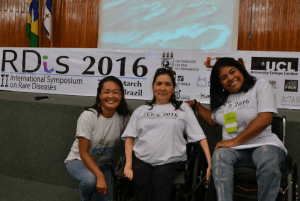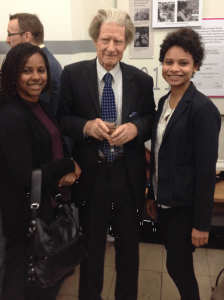Ask an Academic: Professor Sue Hamilton, Director of the UCL Institute of Archaeology
By ucypsga, on 30 May 2019
 Professor Sue Hamilton is Professor of Prehistory and since 2014 has been Director of the UCL Institute of Archaeology.
Professor Sue Hamilton is Professor of Prehistory and since 2014 has been Director of the UCL Institute of Archaeology.
Sue is Principal Investigator of the Rapa Nui (Easter Island) Landscapes of Construction Project (LOC), which has been substantially funded over the past decade by the British Academy and the Arts and Humanities Research Council.
It has been undertaken in collaboration with UK Universities of Bournemouth (co-investigator), Manchester (co-investigator), Cambridge and Highlands and Islands, together with representatives of the Chilean Council of Monuments, MAPSE (the island’s museum) and the indigenous peoples communities of Rapa Nui.
Sue and her team were the first British archaeologists to work on the island since 1914, when the English archaeologist and anthropologist, Katherine Routledge carried out the first true survey of the island.
We spoke to Sue to find out more about her unique partnership with the local indigenous community of Easter Island, and how she navigates the relationship with both the local community and the Chilean government while conducting her research.
What is the project about?
The project studies the sites and artefacts of the Easter Island statue building period (AD 1200-1550) as an interconnected, integrated whole, on a landscape scale. It has involved excavation, mapping of monuments, assessment of threats to preservation and studies of the island’s ancient and present environment.
What’s it like to work on Easter Island?
It’s a remote place, being a tiny Pacific island some 5000 km from the nearest mainland of Chile and 2,500 km from the nearest island, Pit Cairn. The local indigenous community is highly politicised, so all sorts of major internal events continually happen. If you have just a few months away it’s likely there will be completely different ground rules when you get back.
I have been formally working on Rapa Nui (which is the local name) since 2009. Much of the island is covered in prehistoric remains and is a UNESCO designated World Heritage Landscape. In 2017, the Chilean government and National Parks Authority signed over the management of the National Park to the local indigenous community, Ma’u Henua and in 2018 we signed an agreement with the community that ‘LOC’ would advise them on archaeological issues in the park. By the time we got back in January 2019, there were several new people involved in discussing what LOC might work on and the methods to be used. Alongside this, there were new island tensions and new agreements of access to land and methodologies of documentation. Such negotiations to undertake work and its precise format can only be resolved by face to face meetings on each occasion of return to undertake fieldwork. It’s very much based on people trusting you; being able to talk to different individuals, and importantly giving people your time.
How does this partnership differ from others you might have, say with the local community in Camden?
There’s a lot of delicacy that comes with global partnerships. There are all sorts of tiny nuances. Easter Island is famed for its colossal statues and these prompt high profile discussions of the apparent collapse of the society that produced them and of the threats to the conservation of the island and its archaeology in the present; and any work on issues of its heritage always hits the newspapers – even the tiniest thing. Today the local community do at last have a very powerful gift in their hands in managing their heritage, and equally they have had a very embittered history of enormous threats to the survival of their society and traditions, which must be touched upon with empathy and sensitivity.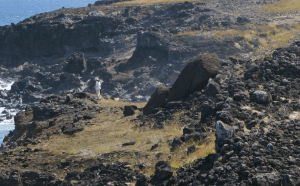
From the time the island was discovered by Europeans in the 18th century the local community had all sorts of terrible things happen to it, in no small part because of European contact brought disease, and ultimately loss of access to their lands. Katherine Routledge in 1914 recorded just 250 islanders compared with a population of maybe 6,000 during the statue building period. With the increasing return of land by the Chilean government in the late 20th century, and the current role of Ma’u Henua the islanders are significantly economically empowered because they have a heritage that tourists pay a heavy Park admissions fee to see.
There are currently about 6,000 islanders and 75,000 tourists go there every year. But this means that there are things that we might think are best for Rapa Nui’s extraordinary archaeology that might not be so good for tourism. We need to take things slowly and take care in giving opinions as ‘privileged academics’, and not for example just leap in with a comment because someone says that’ll make a great quote in a national or international newspaper.
You have to remember it’s not your past, it’s their past, and I think it’s particularly so on Rapa Nui because it’s living heritage – the statues and associated monuments still have an active meaning to the Rapanui; they are not ruins of a now dead past. So a living heritage is something you can’t dabble with and think it won’t affect people.
How did you first come to work on the island?
I was working in Italy and invited my colleague, Colin Richards who worked on similar sites in the UK to come out and see the Italian ones. He spent rather a lot of time on the beach rather than working! So I went down to the beach one day and he was reading Thor Heyerdahl’s Aku-Aku, which is a 1950s popular book about Easter Island. Colin said we ought to go visit Easter Island and when we did we were just stunned by the archaeology and its great potential for new work. It was a great leap for both of us but we ended up co-directing our AHRC funded LOC project. It’s the most amazing archaeology I’ve ever worked on.
How closely are you now working with the Island’s local community?
We are currently doing research into the impact of soil erosion on the island’s archaeology and have been working on the massive ceremonial monuments by the sea and recording the extent to which many are near collapse. Conservation-related work is a good way to be working with the local community and stakeholders, and trying to do something that they want. For instance, they will put their effort into sites that tourists would particularly want to go and see, because that makes current economic sense. For us, this concurrently generates research information about the range and distributions of different categories of archaeological site. There are however numerous archaeologically very important sites beyond the tourist trail that may be key for better understanding Rapanui’s past and we have to find a pathway between both considerations.
Currently, most media people contact me about Easter Island to ask about climate change and rising sea levels and threats to the statues and their associated ceremonial monuments which wrap the island’s coastline. In many cases it’s not actually the sea that’s the most significant problem; it’s mismanagement of the landscape in modern times and the erosional impact of increased rainfall. Huge surfaces of the island are losing their soil. There are about 1,000 statues – which people don’t realise, and a lot of them at the main site where they were quarried are buried so there might be around 3,000. They are variously deteriorating due to lichen growth and the effects of atmospheric salt which penetrates the whole island environment.
Residential fieldwork uniquely creates local friendships; we stay with a local family business for a month each year, and the family have become special friends and are very supportive. A few years ago I obtained a bursary for a Rapanui archaeology student, Fran Pakomi, to come over to the UK and she was trained on our UCL fieldwork course and stayed in my house. It’s these types of visits and exchanges that maintain and solidify connections and trust with distant local communities because they are at the cross-over between work and friendships.
What’s been your best archaeological discovery over there?
I suppose that one of the most dramatic is something that people knew a little bit about, but which we’ve documented and rediscovered many more of, are the carved giant pairs of eyes on the walls of the statue quarry. I always remember reading that in the Marquesas they believed rock to be living and that when rock was taken for monument building, the rock regrew again. We’ve found eyes that you can no longer see by using photogrammetry .
The other one’s a bit more esoteric – it’s just how interconnected things are and how many little stones were moved and how in being impressed by the physically big (such as enormous statues) you can lose the insights provided by small scale things. The builders of the statue period took giant flat cobbles from the beach and must have moved millions of them inland to make pavements and terraces outside of the houses they built. On land, large screes of volcanic rubble were move to create rock mulch, to protect the soil. The kind of human chains involved in moving millions of stones hand-to-hand from seashore inland and redistributing the volcanic rubble is quite incredible.
In the 20th century, the local community was provided with Chilean social housing, which is now seen by many as something to be rejected and demolished. We are now studying this housing and how interestingly a lot actually incorporates aspects of ancient traditions. Now on Rapa Nui there is beginning of building a sort of Polynesia of the modern imagination and an aligned very inventive local architecture that incorporates what they and potentially tourists may think Polynesia is. It’s fascinating to live through these changes as a regular visitor and it gives and insights into local priorities.
Fieldwork in distant places, and living with a local community over numerous years, accretes to make the dynamics of ancestry and heritage recording and isolating conservation and preservation priorities a mixture of diplomacy, empathy and co-production of research to secure the futures of a living past.
 Close
Close



